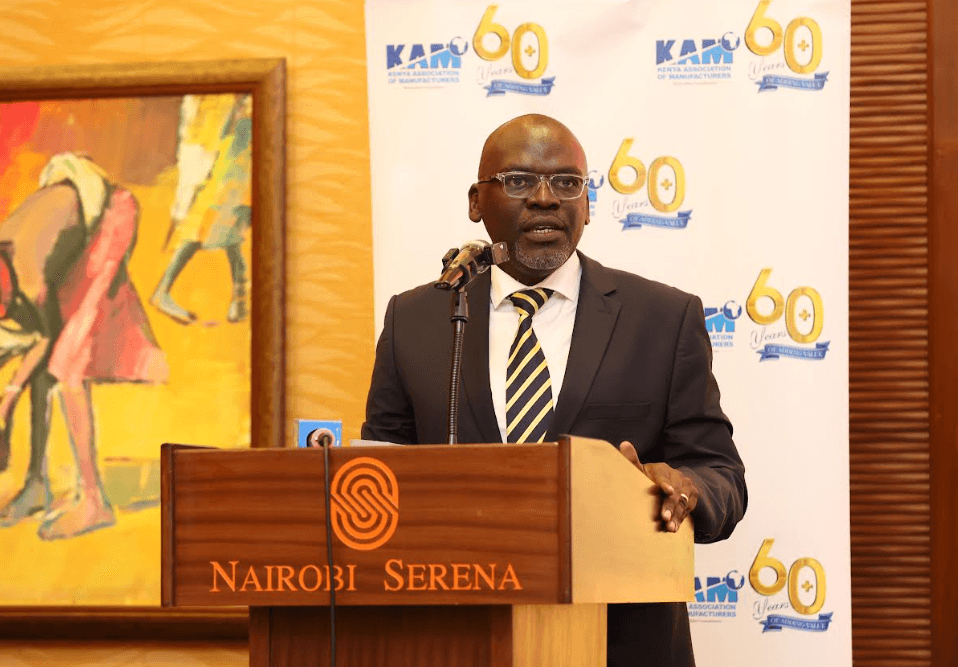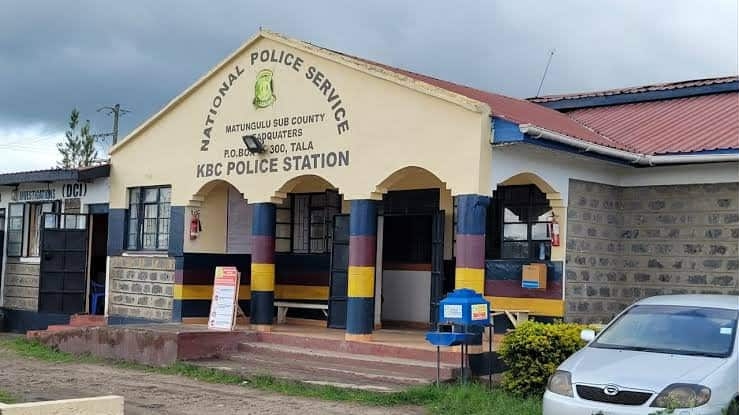"I don’t want to ever see his face again; I wish he gets locked up in prison for life. I want justice...”
Eyes glued to the ground, hands folded in fear, anguish and despair, Rose (not her real name) narrates her ordeal.
She was 10 years old at the time. The man who allegedly stole her innocence was her father.
"How could someone meant to love me unconditionally show me such cruelty?" she asks with tears streaming down her face.
The 16-year-old says her father defiled her three times before she reported him.
These are the words of a 16-year-old girl allegedly defiled by her father.
Her father purportedly threatened to poison her if she dared to tell on him.
Rose says her father was violent, something that drove her mother to leave him and seek refuge elsewhere.
Rose was then taken to her grandmother for custody and protection. She would visit her father during the holidays and that is when he took advantage of her.
"I went to visit my father at home and I found him drinking at a place nearby. The next day, I went to school and on coming back, I found he had prepared porridge and even before I finished taking it, he started following me and I ran directly to school," she narrates.
Rose reported the matter to her paternal grandmother, who said her son was not capable of committing such a crime.
She later reported her father to one of her teachers who informed the head teacher and the search for justice began.
"I feel so bad that my parent could do such a heinous thing to me. He ruined my life. Even in school, my grades have gone low," she says.
Rose’s maternal grandmother Annah was in tears when her grandchild was brought by a boda boda to her home covered in blood.
After three days she went to school where Rose reported the matter.
“After a few days, with the help of the police and Rural Education and Economic Enhancement Programme organisation, she was taken to the hospital for medication,” she says.
The father was arrested and he is currently in police custody awaiting sentencing in court this month.
“I felt bad that such a thing happened. I’m the one who received this girl when she was two years under my care but see what has happened. I want him to be locked up in prison all his life so that he can’t do that to other children,” Annah says.
YOUNG AND VULNERABLE
Cases of family members, leaders and religious leaders sexually abusing young children in the area are not new.
Their actions show a blatant betrayal of trust and a violation of innocent and vulnerable individuals in society.
They use their authority and position to manipulate and abuse children, causing them harm emotionally and physically.
Charlene*, 16, was allegedly defiled by her pastor.
The pastor’s wife had been injured so he requested church members to send a girl to help with chores at his home.
Charlene’s mother was informed that her daughter had been selected to help.
Charlene says she trusted the pastor and never thought he would turn against her.
“I believed he was a good person and someone who was respected but he changed. One day at around midnight, he was praying for his wife and explaining the cause of her accident. He then left the bedroom and came to where I was sleeping on the chair in the sitting room,” she says.
“He woke me up and I thought he wanted me to join them in prayers. However, he covered my mouth and warned me not to make a sound. I tried to stop him but I could not. I threatened to report him but the pastor said he would lose his standing [if I did].”
Charlene says she was afraid to speak up because she thought no one would believe her as the pastor was trusted and respected.
She kept the assault to herself and went home.
After some time, she started feeling pain while relieving herself.
A teacher at school noticed her unusual behaviour and asked her about it.
“I explained what happened to my Biology teacher who told me to write down my problem as an essay and then she took the note to the principal who informed my mother. They later took me to the hospital and we recorded a statement at the police station,” she says.
Charlene says the pastor defiled her five times and infected her with a sexually transmitted disease. She is currently receiving treatment with the help of REEEP.
“It has affected me a great deal, especially in school. Sometimes I can’t concentrate in class because of the pain and it is hard to explain to the teachers. I just say I’m not feeling well and that is it," she says.
“I don’t want to ever see his face because he will make me start crying. The pain that I’m feeling is immense.”
Charlene’s mother cannot hold back her tears.
“I have not gone to church since that happened. I decided to stay home. I have never met the pastor again and I don’t want to ever talk to him. The congregants are angry that I locked up their pastor. They throw words at me saying my family will not be successful and it pains me,” she says.
Charlene’s mother says their lives are in danger as they purportedly receive death threats for locking up the pastor.
The church, she says, still holds services and has amassed a huge following.
“That man should be locked behind bars for life. My young daughter...It still pains me. I don’t even eat because of what happened...The threats I’m receiving and now my daughter is sick. Who will I turn to?” she says helplessly.
These are just but a few of the cases reported in communities as families seek justice for their relatives.
“He should have come for me instead...”
Jane's five-year-old great-granddaughter was allegedly defiled by a distant relative.
The girl, now six, was infected with HIV.
The man approached the little girl one day when no one was in the house and promised to buy her mandazi if she agreed to follow him.
He then took her to a nearby abandoned house, defiled her and took her back home, with no one the wiser.
It wasn't until a few days later that Jane learnt of the unfortunate incident.
“The other children in the house approached me saying that my great-granddaughter was walking around without underwear. I brushed them off. After some time, I realised that it had been a trend for a few days. I called her and when I checked, I could not believe my eyes, her private parts were sore and covered in pus,” she says.
Jane rushed the child to the hospital and recorded a statement at the police station.
The child later opened up about what happened and took the officers to the location where the defilement took place.
With the help of Nyumba Kumi, they arrested the suspect, who within a few months had been released on bond and is currently on the run.
“It is painful to think of what happened to my little girl. The girl is not even mine, I was assigned to take care of her. What he did was evil, I have left it to God and the government to intervene. It is only God who can take over, I’m hopeless, angry and in pain. That man should have come for me instead because I’m a grownup. He has destroyed the little girl's future,” she says.
Defilement by family and clergy members is a grim reality in many communities today.
The very institutions mandated to provide love, care and protection are often the sources of the heinous acts.
The damage caused by this type of abuse is long-lasting and can lead to the breakdown of relationships and trust in society.
REEEP is a women-led organisation at the heart of Busia rescuing girls who have been defiled and offering psychosocial support.
REEEP director Mary Makokha says SGBV is the worst form of violence that can happen to anyone, affecting their mental well-being.
“When a child is sexually abused, you interfere with her thinking and behaviour. Some of the victims that I have handled have been scared mentally to an extent where they do not want to see men,” she says.
Makokha adds that some of the victims become bitter and seek revenge, hurting others and themselves.
“It gets hard. Sometimes I lack the strength to push some cases, especially those riddled with corruption. It becomes hard to push a case when someone who should act on it is compromised. It is painful but the survivors push you to continue pushing,” she says.
Makokha says they have recorded at least 13,878 cases since 1998, with the youngest victim being nine months old and the oldest 94 years old.
“We have old women who have been gang raped, young women who have been defiled. Currently in Busia teenage pregnancies are at 22 per cent and most of the cases are defilement, especially incest,” she says.
Fifteen children turned out to have contracted HIV-Aids, five syphilis, eight gonorrhoea, three vaginal watts and over 100 urinary tract infection.
Makokha says the organisation conducts group therapy where victims open up about how they feel.
She says most cases of SGBV are committed by relatives and people close to the victims, so the family protects the suspects.
“At least 40 per cent of the cases we handle are incest-related and they are increasing. The common one is father-to-daughter defilement. When this happens in some cases a child is conceived and killed immediately or abandoned in hospital,” she says.
“Society has failed because they are the ones protecting the perpetrators and denying the children justice. They do that to protect their marriages."
Ending Social Violence at Equality Now programme officer Jean-Paul Murunga says they are seeking to end such violence, which undermines the dignity and future of women.
Murunga says there is a disconnect when enforcing the law because people mandated to execute it do not understand some provisions or interpret the law using their beliefs.
He says there is a lot of compromise at the community level where sexual violence is not seen as a serious crime.
“The laws are there but implementation has not been as effective as it should be in Busia and many other counties across Kenya. That is why we have taken it upon ourselves to sensitise the duty bearers, including the police, children's officers, gender officers and the magistrates,” he adds.
Murunga says Equality Now is using the multi-sectorial approach to dialogue with the Court Users Committees to handle the cases.
He says magistrates live in fear after handling cases involving high-profile and influential people.
“Incest cases are alarming because that is a place where the children are supposed to feel safe. If you are not safe in the family then there is nowhere else you will be safe.”
WHAT DOCTORS SAY
Edwin Tshombe, a clinical officer at Bumula B Subcounty Hospital, says medical teams play a huge role in defilement cases as they are the first people to handle victims.
He says the hospital handles at least one defilement case every week and up to five cases in a month.
“When victims come to the hospital, we handle their case as an emergency and they are taken through the immediate and long-term medical treatment," Tshombe says.
“We thoroughly examine and give them emergency pills or treatment where applicable and medicine for sexually transmitted infections. We also collect samples to be used by police for further investigations.”
For the long-term treatment, Tshombe says the doctors do follow-ups and psychosocial support.
According to him, the common STDs are majorly gonorrhoea and syphilis.
Takia Mzinza, a counselling psychologist based in Busia, has specialised in helping victims overcome mental, emotional, behavioural and physical challenges affecting their mental wellness.
Mzinza assesses the victim’s needs, provides therapy and develops coping strategies to address and manage the symptoms, cope with and overcome the trauma.
She says SGBV has profiled psychological and physical impacts on survivors that affect their mental wellness.
“When I receive the victims, they are usually in a state of confusion, numbness, shock and disbelief and they struggle to process what has happened. Sometimes, they go through stress and confusion, and blame their families for not helping them,” she says.
Mzinza says the trauma they experience can lead to immediate and long-term psychological issues.
She says victims of defilement who are not supported psychologically can suffer long-term consequences.
“I create a safe space that is child-friendly where the children can process the experience, and share their feelings freely as I take them through the coping mechanism. The youngest child I have counselled is a three-year-old with whom I did play therapy,” she says.
“We give them the choice to play where they can colour and draw to engage them freely when the trust is gained, through that they open up and share their experience, however, it is a bit challenging."
She says during therapy, parents must be present to help with the opening up because, at that time, they may not trust any other person.
In the case of incest, Mzinza says the victims are taken away from the scene of the crime for some time to enable them to forget.
“Most family members who defile their children abuse drugs and most of them went through the same experience when they were young. I have had cases where the men were sodomised when they were in school or had underlying issues when they were children,” she adds.
Mzinza says guardians or parents are the ones to break the news in case the victim has contracted a disease, especially HIV-Aids.
















